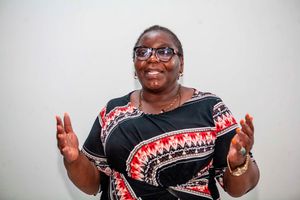
Violet Mukabana (left) and Cleopatra Wanjiku.
In a world where social media often amplifies false lifestyles, a powerful shift is happening on TikTok, where young Kenyans are using their voices to advocate for a cause much larger than themselves.
They are not just dancing or lip-syncing; they are breaking down the walls of stigma that have long surrounded HIV.
Picture videos of men and women in their 20s, openly taking anti-retroviral drugs (ARVs) in restaurants or beaches, telling their stories of living positively with HIV.
There are social media posts of a young HIV-positive mother and her daughter taking ARVs together; others about relationships for openly HIV-positive people and of couples navigating living with HIV together, and others of dietary choices and skin care routines.
A quick search of the hashtag #LivingwithHIV on TikTok reveals several other posts from Violet Mukabana, Cleopatra Wanjiru, Nancy Kolomani and Laura Thuo.
These influencers are showing that the fight against HIV stigma is no longer confined to the streets, but thriving in the digital age, inspiring thousands, and offering hope and education.
While such acts might seem unremarkable to some, in Kenya, where stigma around HIV has historically been intense, these influencers spoke to Lifestyle on this World Aids Day.

Violet Mukabana, 27, is an entrepreneur and HIV awareness champion.
Violet Mukabana is 27 years old
“I am a mother of a six-year-old girl, and I have been living with HIV for six years now. I found out about my status when I was married. My baby was a year old at the time.
I went for a HIV test after having recurring yeast infections. I did the test and unfortunately, it turned out positive. I was shocked because before that I had been going to an antenatal clinic and my results had been negative all through. Plus, I was also breastfeeding. Luckily my baby tested negative.
I was in denial at first and after accepting my status I realised having HIV can be a lonely journey. I had no one to talk to after I separated from my then-boyfriend. I tried to reach out to a couple of people but nobody was responding.
I was getting depressed. I got tired of being silent, so I went public, to free myself. Also, I knew there were people out there like me who were also looking for someone to talk to — I wanted to be available to them.
Going public wasn’t easy. I was immediately stigmatised — getting insulted and trolled online. Nowadays, I have learned not to read negative comments, that's how I deal with stigma.
It’s been four years since and I get a lot of calls, people tell me I’ve given them hope and they’re now taking ARVs.
One thing I’d tell people living with HIV, is to accept your status and start medication. HIV has changed nowadays because we live a normal life. With medication, nothing changes really. We do everything like everyone else, and even the diets are still the same.
If you have a sex life, you should still protect yourself because you can get a different HIV strain.
I would like to see more sensitisation initiatives to normalise talking about HIV and let people know that it’s not a death sentence. Life goes on normally when you take the medication as prescribed. However, going public makes it hard to get a partner because there is still stigma.”

Cleopatra Wanjiku is 31 years old
“I was born with HIV back when information on protecting vertical transmission was low and stigma so high. I didn’t really know I was HIV positive but I was always a sick child and used to be in and out of the hospital throughout primary school. I always questioned why I was different from the other children and wished I could enjoy school like them.
My mother passed away when I was eight years old . My family knew about my HIV status, but lived with the burden of disclosure. It wasn’t until 2007 when I was 13 years old that I was told I had HIV.
Immediately, I was enrolled in the Comprehensive Care Clinic and put on ARVs. My biggest concern then was how I would take medication all my life and also take the tablets in school since I was to join high school the year after.
Taking medication your whole life is hard. It is a lifelong commitment.
There is a time I defaulted for almost a year when I was in college and my health deteriorated.
The truth, I never thought I’d survive, let alone make it out sane but I did. I learnt that the human spirit possesses strength and that every one of us has the power to ride out of their worst nightmares.
I went public about my status in 2020 because I wanted to encourage people to live positively and to be who they want to be. I did it to motivate people who were going through similar situations. Going public hasn’t changed my life much. My principle is that you can’t use what I have accepted about myself against me. I use social media platforms like TikTok to sensitise people to HIV and to fight stigma.
After getting so many messages from people living with HIV, I started an organisation called ‘The Voice of the Black Child’. It’s about giving back— a digital safe space concerned with sensitisation and ending stigma. We are incorporating a food outreach programme to take care of needy children living with HIV.
Despite acceptance, it doesn’t mean living with HIV is all rosy. Rejection and discrimination affect people living with HIV but I’m glad that my experience has not been so bad. It’s also hard for those living positively to freely engage in relationships[romantic] because people have little, if no information about HIV. People out here are mean. My experiences have taught me that most people want you to be unhappy.”
Breaking the silence on social media may have reduced the stigma, but it is still persistent.
Bill Ojwang’, a community health educator and promoter working to implement Global Fund HIV in Western Kenya, says medical progress may have transformed Kenyans' understanding and management of HIV, but “within many societies (stigma still abounds) which shows a reluctance of social attitudes to evolve with scientific advancement.”
According to the Ministry of Health, the estimated number of people living with HIV in Kenya is about 1.4 million while new HIV infections stand at 16,752. HIV/Aids-related stigma affects treatment, delays testing and enrollment in care, which contributes to deaths, estimated at 20,480 deaths in 2024.
The future of HIV advocacy in Kenya — and Africa — lies in the hands of these unlikely heroes: young, brave people using TikTok and other social media platforms to fight stigma, promote awareness, and encourage healthy living.









